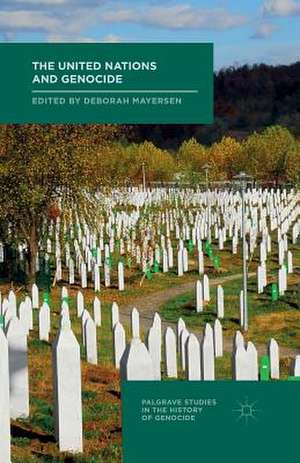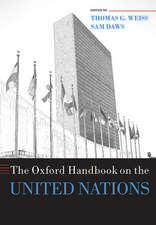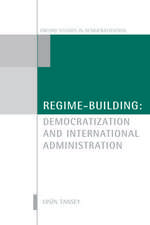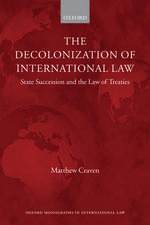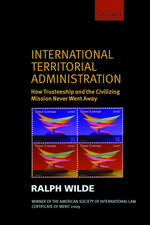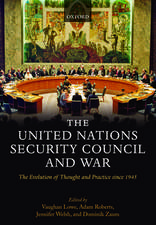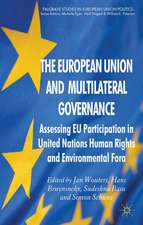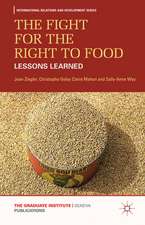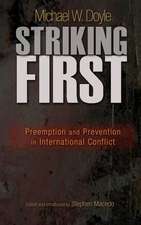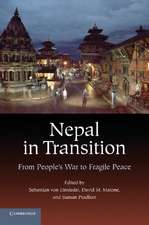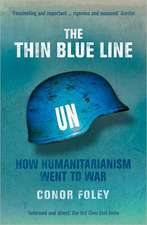The United Nations and Genocide: Palgrave Studies in the History of Genocide
Editat de Deborah Mayersenen Limba Engleză Paperback – 15 mai 2018
| Toate formatele și edițiile | Preț | Express |
|---|---|---|
| Paperback (1) | 450.71 lei 6-8 săpt. | |
| Palgrave Macmillan UK – 15 mai 2018 | 450.71 lei 6-8 săpt. | |
| Hardback (1) | 529.28 lei 6-8 săpt. | |
| Palgrave Macmillan UK – 30 ian 2016 | 529.28 lei 6-8 săpt. |
Preț: 450.71 lei
Nou
Puncte Express: 676
Preț estimativ în valută:
86.24€ • 90.04$ • 71.38£
86.24€ • 90.04$ • 71.38£
Carte tipărită la comandă
Livrare economică 04-18 aprilie
Preluare comenzi: 021 569.72.76
Specificații
ISBN-13: 9781349694815
ISBN-10: 1349694819
Pagini: 272
Ilustrații: XIII, 262 p.
Dimensiuni: 140 x 216 x 14 mm
Greutate: 0.33 kg
Ediția:1st ed. 2016
Editura: Palgrave Macmillan UK
Colecția Palgrave Macmillan
Seria Palgrave Studies in the History of Genocide
Locul publicării:London, United Kingdom
ISBN-10: 1349694819
Pagini: 272
Ilustrații: XIII, 262 p.
Dimensiuni: 140 x 216 x 14 mm
Greutate: 0.33 kg
Ediția:1st ed. 2016
Editura: Palgrave Macmillan UK
Colecția Palgrave Macmillan
Seria Palgrave Studies in the History of Genocide
Locul publicării:London, United Kingdom
Cuprins
Introduction; Deborah Mayersen
1. On Genocide and Colonial Violence; Philip Dwyer and Lyndall Ryan
2. Betrayal and Hypocrisy: The United Nations, Cambodia, and the Khmer Rouge Tribunal; Rebecca Gidley
3. Lessons from Srebrenica: The United Nations after Bosnia; Hariz Halilovich
4. Naming and Framing: Darfur, the Genocide Debate, and the Responsibility to Protect; Jess Gifkins
5. Indonesia and the UN Genocide Convention: The Empty Promises of Human Rights Ritualism; Annie Pohlman
6. When the UN Refuses to Prevent Genocide: Legal, Political, and Religious Factors; Hannibal Travis
7. The Responsibility to Protect and the Responsibility to Assist: Developing Human Rights Protection through Police Building; Charles Hawksley and Nichole Georgeou
8. United Nations Outreach Programmes and Genocide Prevention; Deborah Mayersen
9. Moving Beyond 'Technical Fixes': Genocide Prevention and the United Nations; Stephen McLoughlin
Conclusion; Deborah Mayersen
1. On Genocide and Colonial Violence; Philip Dwyer and Lyndall Ryan
2. Betrayal and Hypocrisy: The United Nations, Cambodia, and the Khmer Rouge Tribunal; Rebecca Gidley
3. Lessons from Srebrenica: The United Nations after Bosnia; Hariz Halilovich
4. Naming and Framing: Darfur, the Genocide Debate, and the Responsibility to Protect; Jess Gifkins
5. Indonesia and the UN Genocide Convention: The Empty Promises of Human Rights Ritualism; Annie Pohlman
6. When the UN Refuses to Prevent Genocide: Legal, Political, and Religious Factors; Hannibal Travis
7. The Responsibility to Protect and the Responsibility to Assist: Developing Human Rights Protection through Police Building; Charles Hawksley and Nichole Georgeou
8. United Nations Outreach Programmes and Genocide Prevention; Deborah Mayersen
9. Moving Beyond 'Technical Fixes': Genocide Prevention and the United Nations; Stephen McLoughlin
Conclusion; Deborah Mayersen
Notă biografică
Deborah Mayersen is Vice-Chancellor's Postdoctoral Research Fellow at the Institute for Social Transformation Research, University of Wollongong, Australia. Deborah's recent publications include On the Path to Genocide: Armenia and Rwanda Reexamined (2014) and (co-edited with Annie Pohlman) Genocide and Mass Atrocities in Asia: Legacies and Prevention (2013).
Textul de pe ultima copertă
The Convention on the Prevention and Punishment of the Crime of Genocide was the first human rights treaty adopted by the United Nations, reflecting the global commitment to 'never again' in the wake of the Holocaust. Seven decades on, The United Nations and Genocide examines how the UN has met, and failed to meet, the commitment to 'prevent and punish' the crime of genocide. It explores why the UN was unable to respond effectively to the genocides in Cambodia, Rwanda, the Balkans and Darfur, and considers new approaches recently adopted by the UN to address genocide. This volume asks the crucial question: can the UN protect peoples from genocide in the modern world?
Caracteristici
Provides a venue for focussed discussion on the history and the future of UN responses to genocide Examines some of the challenges associated with defining genocide and political contestations surrounding labelling events as ‘genocide’ Explores the ongoing legacies of responses to genocide for both the UN and the nations themselves
